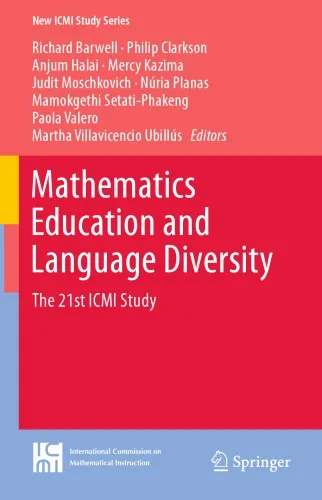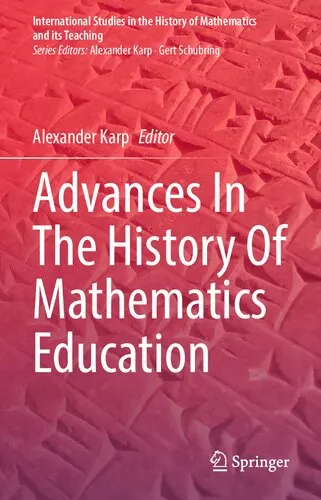Mathematics Education and Language Diversity: The 21st ICMI Study
4.5
Reviews from our users

You Can Ask your questions from this book's AI after Login
Each download or ask from book AI costs 2 points. To earn more free points, please visit the Points Guide Page and complete some valuable actions.Related Refrences:
Introduction to "Mathematics Education and Language Diversity: The 21st ICMI Study"
"Mathematics Education and Language Diversity: The 21st ICMI Study" is an essential contribution to the field of mathematics education, exploring the multifaceted relationship between language and mathematics in multilingual contexts. Edited by a group of internationally renowned mathematics education researchers, including Richard Barwell, Philip Clarkson, Anjum Halai, Mercy Kazima, Judit Moschkovich, Núria Planas, Mamokgethi Phakeng, Paola Valero, and Martha Villavicencio Ubillús, this book reflects collaborative insights from researchers and practitioners worldwide.
The book arises from the need to better understand the role of language diversity in mathematics learning and teaching, particularly in today’s globalized world where multilingual and multicultural classroom environments are increasingly prevalent. It examines challenges, opportunities, and strategies for addressing the diversity of languages and linguistic practices in mathematics classrooms. By situating mathematics education within a linguistically diverse framework, the authors provide valuable perspectives that challenge conventional approaches while opening up new pedagogical horizons.
Detailed Summary of the Book
This volume delves into the connections between mathematics education and language diversity from a variety of angles, including theoretical frameworks, empirical research, and practice-oriented perspectives. The book is organized around the following themes:
- Theoretical foundations: The exploration of how language is intertwined with mathematical thinking and learning.
- Classroom-based research: Case studies from around the world demonstrating the interplay of language and mathematics in multilingual classrooms.
- Policy and curriculum implications: How education systems can adapt to address language diversity in mathematics education.
- Educator perspectives: Challenges and strategies identified by teachers and educators working in linguistically diverse settings.
Throughout the text, the editors and contributing authors make a strong case for the importance of addressing language diversity as a central component of mathematics education. The book offers insights into both the complexity of multilingual mathematics classrooms and the creative possibilities for leveraging students’ linguistic resources to support learning.
Key Takeaways
- Language as a resource: Language diversity can serve as a pedagogical tool to enrich mathematics learning rather than being viewed as a barrier.
- Conceptual understanding: Multilingual approaches can deepen students' conceptual understanding of mathematical concepts.
- Teacher preparation: Educators need training to navigate linguistic complexities and to use effective strategies in multilingual classrooms.
- Global insights: Lessons from diverse cultural and linguistic contexts can inform educational practices on a global scale.
- Equity and inclusion: Addressing language diversity helps in creating equitable and inclusive mathematics learning environments for all students.
Famous Quotes from the Book
"Acknowledging and leveraging students’ linguistic repertoires is not just a matter of inclusion but a pedagogical necessity to uncover deeper mathematical understanding."
"Mathematics is not a universal language—it is entangled with the cultures and languages that give it meaning in different contexts."
Why This Book Matters
This book is a crucial resource for mathematics educators, policymakers, and researchers working in a world characterized by increasing linguistic and cultural diversity. It highlights pressing issues related to language in mathematics education, emphasizing equity and inclusion in ways that resonate with global educational challenges.
With its multidisciplinary approach and contributions from experts across the globe, the book raises awareness about the pivotal role of language in shaping mathematical understanding. It provides actionable recommendations to enhance teaching practices and foster equitable learning opportunities for students who navigate multiple languages. As multilingualism becomes the norm in classrooms worldwide, the insights from this book are indispensable for advancing both research and practice in mathematics education.
In a world striving for educational equity and excellence, "Mathematics Education and Language Diversity: The 21st ICMI Study" is a guiding light for creating inclusive, equitable, and innovative mathematics education for students of all linguistic backgrounds.
Free Direct Download
Get Free Access to Download this and other Thousands of Books (Join Now)
For read this book you need PDF Reader Software like Foxit Reader
Accessing books through legal platforms and public libraries not only supports the rights of authors and publishers but also contributes to the sustainability of reading culture. Before downloading, please take a moment to consider these options.
Find this book on other platforms:
WorldCat helps you find books in libraries worldwide.
See ratings, reviews, and discussions on Goodreads.
Find and buy rare or used books on AbeBooks.



